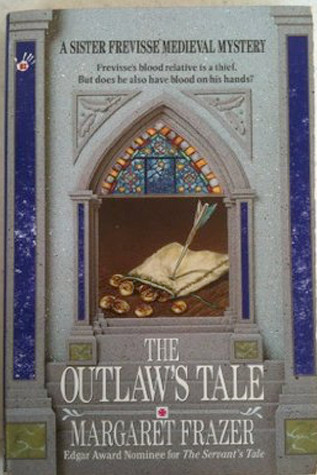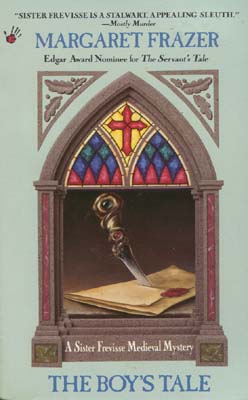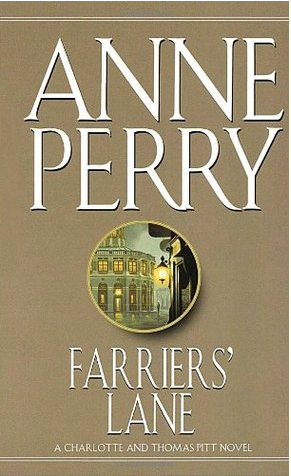I received this book for free from the library in exchange for an honest review. This does not affect my opinion of the book or the content of my review.
Source: the library
The Widow's Tale
by
Margaret Frazer
historical mystery in a paperback edition that was published by Berkley on January 3, 2006 and has 272 pages.
Explore it on Goodreads or Amazon
Other books by this author which I have reviewed include A Play of Knaves, A Play of Lords, A Play of Treachery, A Play of Piety, Murder Most Medieval: Noble Tales of Ignoble Demises, A Play of HeresyCoventry, Easter, plays, murder, spies, guilds, mercer, jealousy, Judas, theater, directing, acting, suicide, costumes, religious plays,, The Novice's Tale, The Servant's Tale, The Outlaw's Tale, The Bishop's Tale, The Murderer's Tale, The Boy's Tale, The Prioress' Tale, The Maiden's Tale, The Squire's Tale, Clerk's Tale, The Bastard's Tale, The Hunter's Tale
Fourteenth in the Dame Frevisse medieval mystery series and revolving around a Benedictine nun with a nose for clues in 1449. The focus is on a beleaguered family in Hertfordshire.
It’s been two years since Suffolk forbade Alice to meet with Frevisse (The Bastard’s Tale, 12).
My Take
It’s a mean, greedy story of a mean and greedy man, taking advantage of a a newly bereft family through bribery and forced incarceration, kidnapping, and forced marriage. It makes me grateful for women’s lib and our current laws when stories such as The Widow’s Tale demonstrate how one-sided life was in the past. No, I’m not saying today is perfect, but I much prefer due process. I wouldn’t return to the mid-14th century for anything! Not as a woman anyway!
It’s a convenient fiction, that of Dame Frevisse playing detective, as it gives Frazer such lovely opportunities to show us English life in the mid-1400s from simple daily living in the country and the city, of spies and lawyers, of laws and customs, the food and dress, manners and expectations, and more. It includes politics whether its those of the court, within the neighborhood, within families, and all points in between as well as a look at how the genders and classes are treated.
And up to now, the nuns have been welcome wherever they go. Not here. We all have someone in the family who’s a nasty wart on the world, and poor Cristiana will pay heavily for this one. What I don’t understand is why Edward didn’t do more to protect his family? And why would Abbot Gilberd acquiesce in this? It doesn’t seem to fit his character.
Part of the underlying theme of the series involves royal politics, or rather, the machinations of the nobles at court, and specifically Lord Suffolk and his circle and how they manipulate the king. I keep thinking that I must look into the history of this, for I’m curious to know if Suffolk ever fell from grace, *fingers crossed*. And so it goes…will Suffolk’s fate appear in a future Dame Frevisse?
Edward puts it well: he’s not selling his daughters off so that Laurence’s ambition can be satisfied. It’s a sad tale, and one I would have preferred to skip even though Frazer wrote it well. Too well, really, as I was by turn furious and sad until I cried at the end. For she’s lost so much…
The Story
It’s a May Daying party which Laurence is determined to spoil with his demands about Edward’s lands and marrying Mary off to his son. The man simply will not accept no for an answer.
Unfortunately, he doesn’t have to accept that no for long, and Laurence quickly takes control, hiding the kidnappings, only Mary won’t cooperate, and Laurence is forced to beg Cristiana’s help. Hah.
The Characters
Dame Frevisse would much prefer to be left to her copying, but her natural curiosity, skillful observations, and innate sense of justice won’t let her back away from a mystery.
Others of the nuns include:
Sisters Johane and Amicia, Domina Elisabeth is the abbess still, Ela is one of the servants, Dames Perpetua and Juliana, Dame Claire is still the infirmarian, Sister Thomasine is even saintlier than ever, and Sister Margarett is the current cellarer.
Master Naylor is the nunnery’s steward. Father Henry is still the nunnery’s priest. Abbot Gilberd is Elisabeth’s brother, and St. Frideswide’s is under his care and protection.
Edward Helyngton is married to Cristiana and allied to my Lord Suffolk. Mary is their twelve-year-old daughter while Jane is eight. Sir Gerveys Drury is Cristiana’s brother, even though he’s one of York’s. Pers is Gerveys’ squire who’s been with him since they were boys. Ivetta, a carpenter’s widow, is the girls’ nurse with a grown son, Nicholas, of her own; she and Pers are sweet on each other.
The widowed Laurence Helyngton is Edward’s cousin, and a meaner snake you’ll never meet. Well, until you meet Milisent. Clement is his loutish son. His sisters, Milisent and Ankaret, are married respectively to Master Henry Colles with his hard little eyes and Master Petyt, a wealthy clothier who doesn’t seem to notice his wife making sheep’s eyes at every comely man.
John Say is also Suffolk’s man and Speaker of Parliament, but the king is first and foremost in his heart. Beth is his quiet, unassuming wife. Their children are Geneffeve, almost two, and Betha, Beth’s daughter from a previous marriage, who is six. Master Fyncham is the house steward, Nurse came from Beth’s first household, Edmund is valet to Say, Sawnder and Rafe are men-at-arms, and Reignold is one of the kitchen help. Father Richard is the local priest.
William de la Pole is the duke of Suffolk and married to Frevisse’s cousin, the very worried and twitchy Lady Alice. He is a power at court and with King Henry VI who is married to Queen Margaret. Charles VII is king of France.
The Cover and Title
The soft-looking cover is split in half vertically with blurbs, the title, the series name, and the author’s name against a pale mint background on the right while the left is a perspective of the land with the manor house slightly above the center and a parade of horses and a sedan chair winding up the road towards it.
The title is The Widow’s Tale as her life unfolds and disintegrates around her.















